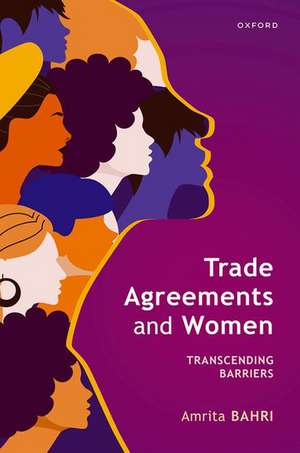Trade Agreements and Women: Transcending Barriers
Autor Amrita Bahrien Limba Engleză Hardback – 13 feb 2025
Preț: 600.01 lei
Preț vechi: 859.52 lei
-30% Nou
Puncte Express: 900
Preț estimativ în valută:
114.83€ • 124.68$ • 96.45£
114.83€ • 124.68$ • 96.45£
Carte disponibilă
Livrare economică 21-27 martie
Preluare comenzi: 021 569.72.76
Specificații
ISBN-13: 9780198935728
ISBN-10: 0198935722
Pagini: 304
Dimensiuni: 162 x 240 x 23 mm
Greutate: 0.61 kg
Editura: OUP OXFORD
Colecția OUP Oxford
Locul publicării:Oxford, United Kingdom
ISBN-10: 0198935722
Pagini: 304
Dimensiuni: 162 x 240 x 23 mm
Greutate: 0.61 kg
Editura: OUP OXFORD
Colecția OUP Oxford
Locul publicării:Oxford, United Kingdom
Recenzii
This is a remarkable book as it courageously raises all the right, but sometimes uncomfortable, questions and masterly guides us in our own search for answers. What are the barriers to women's economic empowerment and how are they related to trade? Can trade agreements play a role in overcoming these barriers? What can be learned from efforts already made in this regard? What should/could be done next to ensure that trade genuinely works for all, particularly those who have been historically marginalized, as women have? Amrita Bahri's timely book makes an important contribution to the discussion on how trade agreements can maximize the benefits and minimize the negative impact that trade may have on women.
This book will serve as a major reference for any reader, expert or not, who intends to better comprehend the trade and gender nexus. It guides both negotiators and non-negotiators through the complexities of gender-responsive free trade agreements, providing a detailed legal analysis of gender provisions. This analysis makes previous publications on the topic from the last decade obsolete. Understanding how trade agreements incorporate gender equality is crucial, as they shape national trade policies and influence international approaches. This book is a much-needed and essential primer for anyone considering a deep dive into trade and gender equality.
Mainstreaming gender in trade agreements can play a key role in addressing the systemic challenges that women and other marginalised stakeholders face in cross-border and international trade. Amrita tackles this important agenda by investigating these systemic challenges and the impact of mainstreaming gender in trade agreements. The legal compact of the African Continental Free Trade Area (AfCFTA) includes a Protocol on Women and Youth in Trade. As State Parties implement the AfCFTA, the lessons that Amrita draws from this comprehensive analysis provide an important resource for governments, business associations and traders. I am very pleased to recommend this important contribution to the discourse, the analysis, and the practice of mainstreaming gender in trade agreements.
This book will serve as a major reference for any reader, expert or not, who intends to better comprehend the trade and gender nexus. It guides both negotiators and non-negotiators through the complexities of gender-responsive free trade agreements, providing a detailed legal analysis of gender provisions. This analysis makes previous publications on the topic from the last decade obsolete. Understanding how trade agreements incorporate gender equality is crucial, as they shape national trade policies and influence international approaches. This book is a much-needed and essential primer for anyone considering a deep dive into trade and gender equality.
Mainstreaming gender in trade agreements can play a key role in addressing the systemic challenges that women and other marginalised stakeholders face in cross-border and international trade. Amrita tackles this important agenda by investigating these systemic challenges and the impact of mainstreaming gender in trade agreements. The legal compact of the African Continental Free Trade Area (AfCFTA) includes a Protocol on Women and Youth in Trade. As State Parties implement the AfCFTA, the lessons that Amrita draws from this comprehensive analysis provide an important resource for governments, business associations and traders. I am very pleased to recommend this important contribution to the discourse, the analysis, and the practice of mainstreaming gender in trade agreements.
Notă biografică
Dr. Amrita Bahri is Associate Professor of International Trade Law at the Instituto Tecnológico Autónomo de México (ITAM) and Co-Chair Professor for the WTO Chair Program (Mexico). In her research and publications, she explores how trade laws, agreements, and policies can empower marginalized groups, especially women. As a founding member of the WTO Gender Research Hub, Amrita has worked on trade and women-related projects with various countries and international organizations, including the United Nations Economic Commission for Africa, the International Trade Centre, and the World Trade Organization. While collaborating with the ITC team, Amrita designed the first framework to measure the gender responsiveness of trade agreements. She also serves on the editorial board of prestigious academic journals and is among the candidates appointed by the European Commission to chair the Expert Panel Proceedings on Trade and Sustainable Development.
